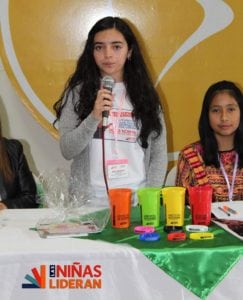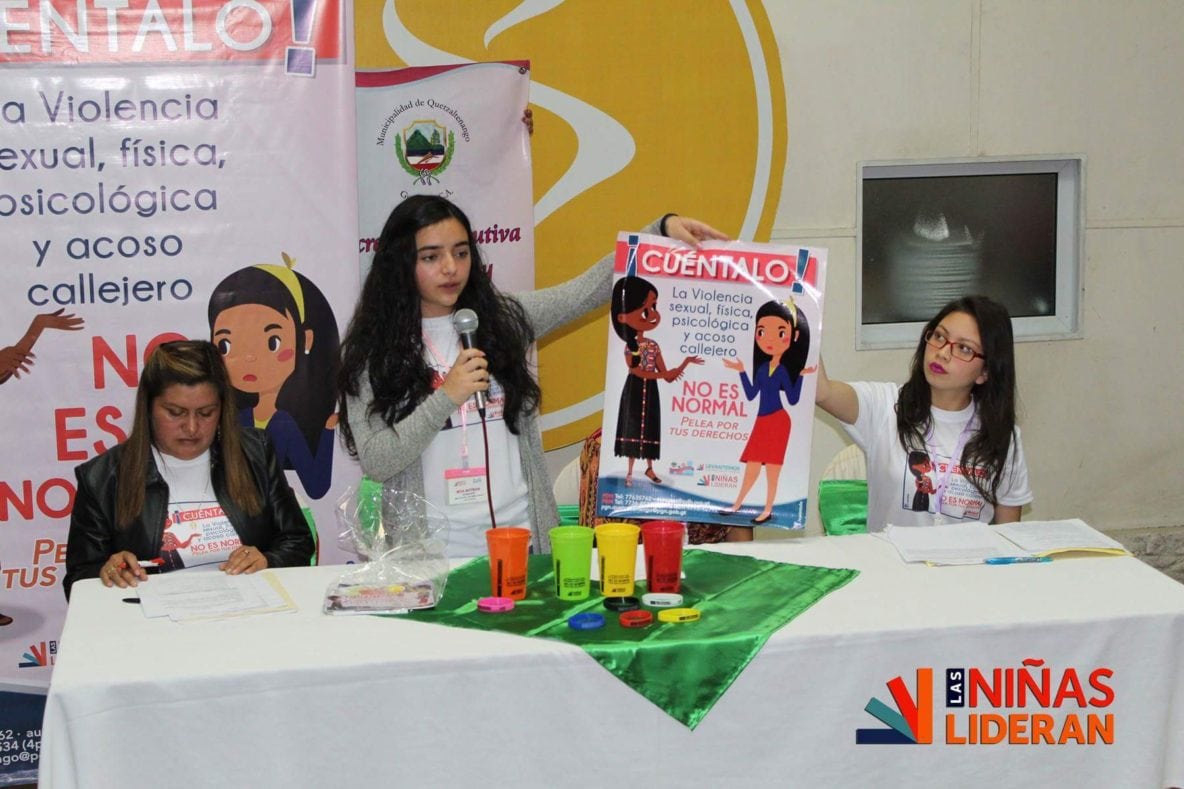Girl leader: Rita, 17 years old, Guatemala
Rita is a girl leader in Rise Up’s Let Girls Lead Municipal Girl Network, a girls’ advocacy and leadership program in her town to improve girls’ access to education, healthcare and safety. Rise Up empowers girl leaders and local organizations to guarantee girls’ rights through girl-centered advocacy.
Rita believes in the power of girls to improve the lives and well-being of their families, their communities and their country. Rita shares with us what it is like to work on behalf of other girls.
Tell us a little about Rise Up’s Let Girls Lead Girl Network you are part of. How did you learn about it? What made you want to join?
Rita: Rise Up’s Let Girls Lead Network in Quetzaltenango is a local departmental network of like-minded adolescent girl leaders that fight for human rights, especially for adolescent girls and women.
The girls’ network made a call for applications for more girls and adolescents to join, and this call came to my school. I instantly became interested because since I was little I have felt a calling to help those who need it most, and finally have found a way to do it, and that is thorough my work in this network.
Describe what kind of activities your group is doing as part of your sexual violence and harassment campaign that you are leading.

Rita speaks at a press conference and launch of Rise Up’s Let Girls Lead Girls Network anti violence campaign.
Rita: We recently launched our campaign called “Tell Someone!” And the first activity we are doing is visiting various public and private schools to give workshops about how to identify violence, how to avoid perpetuating it and how to report all types of violence and sexual harassment.
We have also been placing posters, banners, and stickers on public markets, buses and other strategic public places around the city to raise awareness about gender based violence and to give people the information and resources they can turn to for help. We are also working directly with bus drivers and market vendors who we have identified harass girls and women the most, and we have a talk scheduled with them with the hope of engaging them to reduce street harassment.
We will also continue recording and airing radio spots and programs throughout the year.
Tell us about the radio component of the campaign. What do you like most about doing radio?
Rita: We have partnered with a national public radio where we are producing and recording radio programs on different topics like violence, discrimination, indigenous cultural identity and many other issues, all aimed for young audiences. I love working on radio programs because it is a very creative and fun way to reach many children and their parents across the country. Radio engages and grabs the attention of listeners in many different ways. Check out this Radio Spot on physical violence we recorded as part of our campaign.
Can you share a radio interview or piece that you are especially proud of?
Rita: I really enjoyed working on a radio episode on “cultural and ethnic discrimination” because Guatemala is a multicultural and multi-ethnic country, yet there are still many people who do not realize how beautiful and important this is, and If we do not recognize its importance every beautiful culture and ethnicity in our country would be at risk of disappearing.
Have you or your friends faced barriers in going to school? If so, tell us about them.
Rita: I have not faced educational barriers personally or any of my friends, however, there are many girls in our country who are not allowed to finish their schooling because their families believe that after a certain age girls belong at home doing housework. This is one of the reasons that motivates me to be part of the network and defend girls’ rights to go to school.
What changes have you seen in your community since participating in the network and the campaign?
Rita: I have seen a lot of interest in the schools we are working in, and we have motivated school children to tell someone if they or anyone they know is a victim of violence. A teacher told me that several children were already approaching her asking for help.
I see that the community is responding positively to our campaign because lots of people are impressed and join us while we are out on the street doing our mobilization activities. There are people and businesses who have offered us their support, newspapers who want to interview us, and other organizations who have approached us interested in having our campaign carried out in other departments in Guatemala.
Why are you passionate about girls and girls’ education?
Rita: I am passionate about working on behalf of girls because in our society there are many people who do not yet fully accept gender equality, and this is an essential cause to move forward as a country.
Do you have plans for your future? What do you want to be when you grow up?
Rita: I am interested in studying three things: industrial engineering, clinical psychology and speech therapy. I am interested in starting a school for children that are differently abled since in Guatemala there are not many schools of this kind, and I recognize the importance of providing high quality education to all children. I am also interested in supporting a foundation that helps street animals, also because in Guatemala too many animals are abandoned or abused, and this foundation will fight for the rights of animals.
If you could change something about your community what would it be?
Rita: I would change the close minded way in which a large part of the population thinks. Many people from various towns, villages and municipalities think things like “Women stay at home while men work”, “It’s better to work than to study”, among others, all this needs to change because I believe that mentalities like this are what keeps us from advancing as a country.
We’re inspired by you! Tell us who/what inspires you!
Rita: Witnessing the difficult reality of many people in my country motivates me to continue defending their rights and venture to imagine a society free of violence, inequality, racism and above all to see our country progress firmly.
Rise Up advances health, education, and equity by enabling girls, youth, and women to transform their own lives, communities, and countries. Rise Up invests in visionary leaders, local organizations, and innovative solutions to achieve large-scale change through leadership development, advocacy capacity building, grantmaking, and effective storytelling. Since 2009, Rise Up’s powerful network of over 500 leaders has directly benefited 7 million girls, youth, and women, and advocated for over 100 laws and policies impacting 115 million people in Africa, Latin America, South Asia, and the US.


